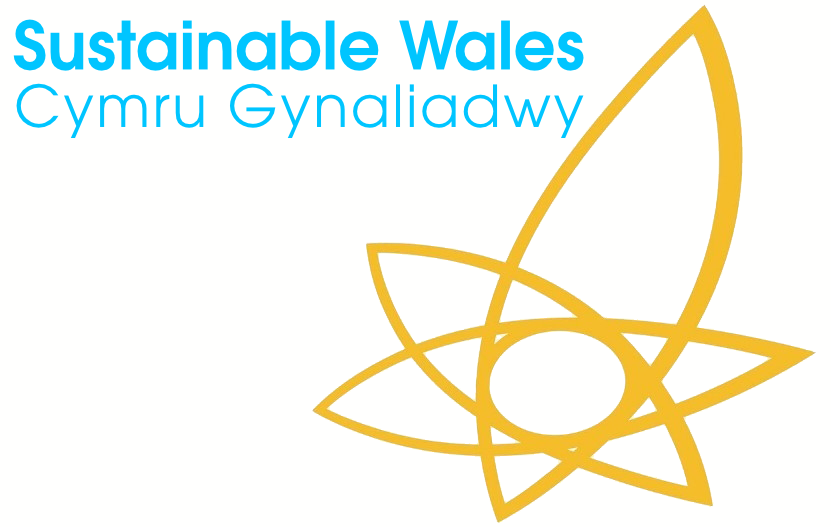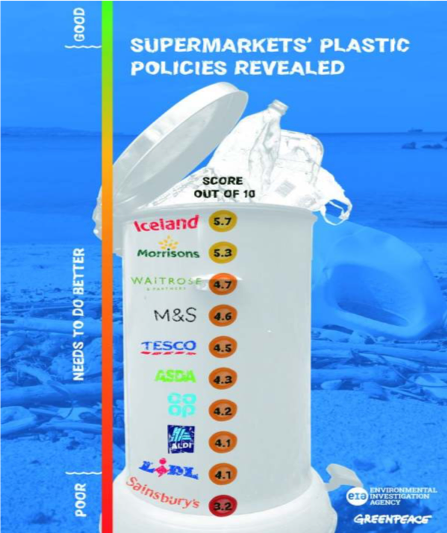CHARITY CALLS FOR
SUPERMARKETS TO ACT ON PLASTICS!
As part of Sustainable Wales’ ongoing campaigns regarding the vital issue of plastic pollution here is the text of a letter sent to supermarket management locally and head offices. We will be following up this campaign across 2019 and we will update you with progress reports.
The charity, Sustainable Wales, has urged local supermarket managers and UK bosses to slash their plastic packaging. Research from Greenpeace shows that current supermarket plans are inadequate. (note1)
SW Director, Margaret Minhinnick says: “Plastic-free campaigns are developing UK-wide, but the public cannot be expected to bear the burden alone.”. (e.g. Bridgend Borough Council (lead Cllr Tim Thomas) and also Porthcawl Town Council (lead Cllr Alex Harris, have joined the ‘Surfers Against Sewage plastic-free towns’ campaign. https://www.sas.org.uk/plastic-free-communities/)
“Sustainable Wales (SW) encourages behavioural change within the community https://www.sustainablewales.org.uk/
We also offer a range of plastic-free, re-fill schemes and remade goods in our shop, SUSSED in Porthcawl.
Indeed, before the introduction of the 5p single use levy by the Welsh Assembly, SW employed a ‘plastic bag free-Bridgend campaign officer’ - working with local traders and the council, also providing evidence to the Welsh Assembly”, added Margaret.
Plaid Cymru Cllr Tim Thomas commented.
"I am always keen to look at innovative ways to reduce our single use plastic and I welcome the initiatives from Sustainable Wales to tackle this problem at source from supermarkets. The public have certainly played their part and many people have changed their behaviour, it's high time large supermarkets reciprocate." he continued.
(Note 1)
According to Greenpeace and Environment Investigation Agency (Dec 2018) the top 10 supermarkets collectively put more than 810,000 tonnes of plastic on the market each year. This is in addition to more than 1.1 billion single-use plastic bags, 958 million bags for life and 1.2 billion plastic produce bags for fruit and veg.
There is also a shortage of plans in place to stem the flood. Most commitments made by supermarkets are weak, with room for improvement, they say.
The league table found that:
· Five supermarkets have no specific targets to reduce plastic packaging – Aldi, Co-op, Sainsbury’s, Tesco and Waitrose. And of the supermarkets that do have targets, most are moving at such a slow pace that it would take them 20 years to completely rid their shelves of throwaway plastic.
Iceland has the most ambitious reduction targets aiming to get rid of all plastic packaging of its own brands by 2023.
Only four supermarkets offer customers some options to use refillable containers. 86% shoppers support the idea of supermarkets moving towards using more refillable and reusable packaging but only Morrisons is showing much promise on it so far.
Greenpeace wants supermarkets to eliminate non-recyclable plastic, like black plastic, by 2019. Most have agreed to do so by 2025. Only four have adopted earlier time frames – M&S and Aldi by 2022; Waitrose and Co-op by 2023. The Co-op currently has the highest proportion of recyclable plastic packaging, at 79%.
More details here https://checkingoutonplastics.org
FACTS. The plastic in our oceans could circle the planet 400 times threatening marine ecosystems and contributing to climate change.
Plastics have polluted the oceans to such an extent that no area is left uncontaminated. They originate on land, are transported by wind, rivers and untreated sewerage into the sea due to poor waste management systems.
Plastic fragments but does not biodegrade. They are a symbol of a throwaway culture.
1 in every 10 barrels of oil now used to create new plastic.

